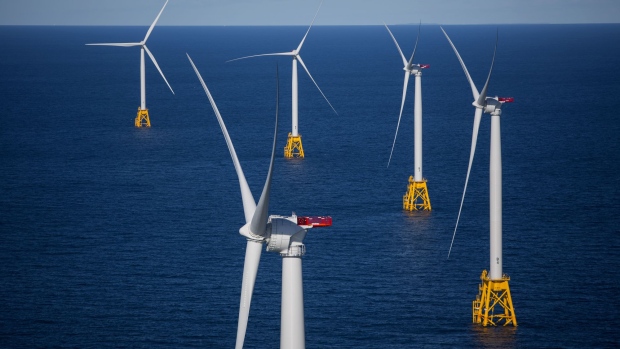Jul 20, 2022
Biden Maps Path Around Manchin on Climate With Aid on Wind, Heat
, Bloomberg News

(Bloomberg) -- President Joe Biden will announce unilateral moves to combat climate change, including opening additional offshore areas to wind farms, after Senator Joe Manchin’s objections halted legislation to curb rising temperatures.
Biden will outline his plans Wednesday at a former coal-fired power plant in Massachusetts that’s being re-purposed to support wind power generation. But he’ll stop short of declaring a climate emergency -- a move sought by advocates that would unlock broad new powers to develop clean power and restrict the transport of fossil fuels.
“This is all about him making the case not just to shift away from the fossil fuels of the past, but to look at the opportunities across the country that are growing,” White House National Climate Advisor Gina McCarthy told CNN on Wednesday.
Biden has laid out a goal of deploying 30 gigawatts of offshore wind power by 2030, with auctions of territory near California expected later this year, and, ultimately, lease sales on almost every US coast.
The president is under pressure to meet his campaign promises of aggressive action against climate change without also alienating Manchin, a moderate Democrat whose vote is critical in the evenly divided Senate. The West Virginia lawmaker both represents a coal state and draws much of his own personal wealth from the industry.
Other measures Biden will announce Wednesday include support for home energy subsidies and funding for communities seeking to build resilience to the impact of climate change, an official said in a written statement Wednesday.
The administration hopes to retain Manchin’s support for an important health-care bill that would lower costs for both prescription drugs and Obamacare insurance plans before midterm elections in November.
Administration officials continue to study an emergency declaration, and McCarthy said more announcements would be made in the coming weeks. White House Press Secretary Karine Jean-Pierre declined to say Tuesday whether Manchin was a factor in delaying the declaration, but said it would not be made this week.
Biden is grappling with how to squeeze more legislative accomplishments out of a narrowly divided Congress. In the Senate, Manchin and every other Democrat effectively possess veto power over any bill Democratic leaders try to advance using the fast-track budget reconciliation process, which averts a Republican filibuster by requiring only a simple majority for passage.
Democrats haven’t completely abandoned hope of a reconciliation package that includes climate and tax measures. Manchin suggested he might be open to considering them in September, after further reports on US inflation and the Federal Reserve’s response.
The senator has said his reticence to move forward on major Democratic priorities is based on deep concern about inflation, even though the climate and tax measure he blocked would cut the federal budget deficit and raise taxes on wealthy Americans, moves that stand a better chance of slowing price increases than accelerating them.
©2022 Bloomberg L.P.


